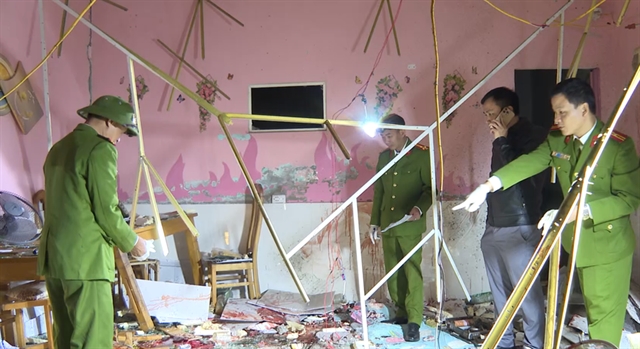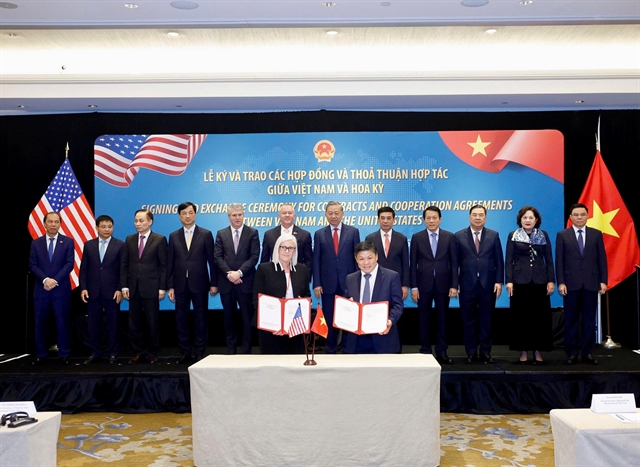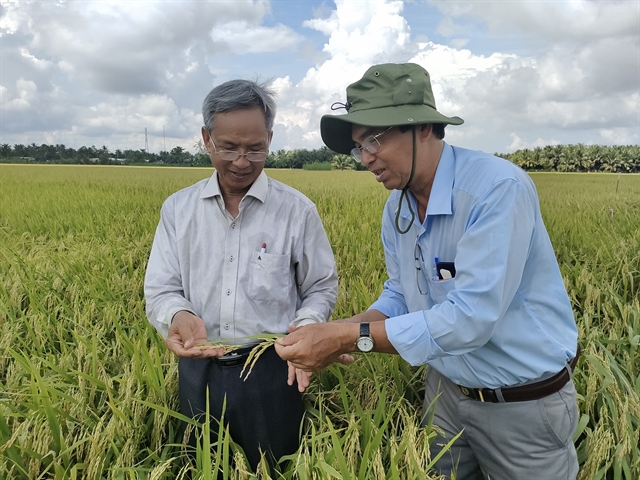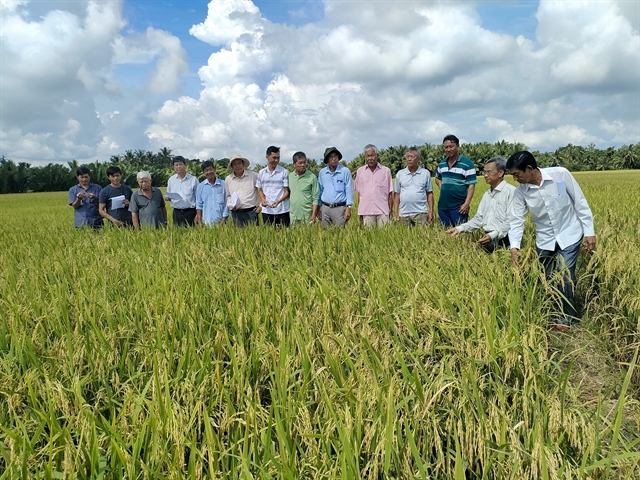 Society
Society


|
| Dr Huỳnh Quang Tín (left) guides a farmer in selecting rice varieties. — Photos Huỳnh Phúc Hậu |
CẦN THƠ — Turning the rice fields into a classroom where students are farmers, Associate Professor and Dr Huỳnh Quang Tín from the Mekong Delta Development Research Institute, Cần Thơ University, has guided and trained many farmers to become "agricultural engineers".
The "agricultural engineers" that were born out of these efforts have successfully engaged in breeding new rice varieties, making significant contributions to rice production in the Mekong Delta region, considered the 'rice bowl' of the country.
At the summer-autumn rice fields of Phạm Văn Long's family in Long An Commune, Long Hồ District, Vĩnh Long Province, Dr. Tín from Cần Thơ Province and local farmers are busy evaluating the 15 rice varieties that Long was experimenting with. These are rice varieties that Long personally crossbred to identify strains with high yields and strong resilience to the current climate changes.
Long told the Vietnam News Agency that previously, he was just a farmer with no interest in selection or crossbreeding of rice varieties. But participating in the "Community rice breeding" class, guided by Tín, sparked the passion for rice crossbreeding in him and his wife.
As a farming family without educational opportunities, the enthusiastic guidance and assistance from Dr Tín has helped Long as if he was attending a real university.
Not letting down his teacher's encouragement, after 10 years of researching rice crossbreeding, farmer Long successfully crossbred the Long Hồ 8 rice variety (LH8), which has been officially recognised for production by the Department of Crop Production under the Ministry of Agriculture and Rural Development.
The LH8 variety demonstrates good salt tolerance, making it suitable for saline-affected land in provinces such as Trà Vinh, Sóc Trăng, and other localities in the Mekong Delta region.
Additionally, Long continues to research and crossbreed new rice varieties that are adaptive to climate change.
He said without the encouragement and dedicated guidance from teacher Tín, along with the support of local authorities, a farmer like him would never have the capability to crossbreed rice, as this is typically considered a task for scientists.
Phạm Văn Nhựt, a farmer from Phong Nẫm Commune, Giồng Trôm District, Bến Tre Province, said he initially joined the "Community rice breeding" class primarily to learn how to restore local rice varieties that had deteriorated. However, after participating in the class, he developed a passion for selecting and crossbreeding rice.
He said participating in the rice breeding class led to the successful restoration of the local OC10 rice variety.
He also successfully crossbred the purple rice variety, a distinctive black and aromatic rice. With the guidance of professor Tín, he was encouraged to bring the purple rice product directly to the market.
Now, he is the sole farmer in Bến Tre Province with a purple rice product that he produces and supplies to the markets in Bến Tre and HCM City.
The purple rice product meets the three-star OCOP standards.
Nhựt said that the practical field lessons taught by professor Tín have helped him and many local farmers enhance their research capabilities, access new scientific and technical knowledge, apply them to production, and increase efficiency and profitability.
According to Tín, alongside training agricultural engineers at Cần Thơ University, the project "Agricultural knowledgeable farmers" is an essential source for training human resources because farmers are directly involved in practical production, creating products for the Mekong Delta rice industry.
While young students may lack experience in production, farmers have a deep understanding of the fields. If equipped with agricultural knowledge and breeding techniques, they can collaborate more effectively, choosing the right rice varieties for their specific land, adapting to current climate change conditions.

|
| A practical lesson on seed selection in the field. |
Dr Tín said there's an old saying, "First is water, second is fertiliser, third is cultivation and fourth is seed."
The first three issues have seen the application of numerous scientific and technological advancements by farmers.
However, the matter of seeds in production hasn't received sufficient attention.
Therefore, providing additional knowledge in breeding and seed selection will gradually change the habits of farmers, leading them towards modern production methods.
"Farmers participating in rice breeding have made efforts to learn and conduct research like true scientists to create new rice varieties. They have worked quietly, persistently and passionately, much like true scientists in action."
Tín said the "Community rice breeding" project has trained over 30 progressive farmers who are passionate about scientific research. They have received specialised training and participated in rice breeding.
As a result, more than 300 pure lines have been developed by these farmers through breeding and testing, providing seeds to the community. Dr. Vũ Anh Pháp, deputy director of the Mekong Delta Development Research Institute, said the project has focused on enhancing agricultural research capabilities for farmers and local technical officials.
The project has trained hundreds of local officials and more than 10,000 farmers on techniques to improve rice seed quality at farms and select new rice varieties to adapt to climate change.
"The results of the project have had a great impact. It has created human resources with in-depth knowledge of rice seed production techniques and choosing suitable rice varieties for the locality.
"High-quality seeds are being manufactured and supplied to farmers within the community. This not only helps increase productivity and reduce the cost of purchasing rice seeds, but also improves the quality of exported rice, meeting about 30 per cent of the total seed demand for rice production in the Mekong Delta," Pháp said.
She said Dr Tín is not just a teacher but also a close companion to the farmers. His passion and contributions have greatly impacted the overall development of agriculture, especially rice. He also spends a lot of effort to find many projects to support farmers.
The classes conducted beyond the fields have provided farmers from different areas with a platform to connect and share experiences in cultivation and rice variety selection, enhancing agricultural production efficiency.
Dr Tín has effectively nurtured "agricultural engineers," gradually steering farmers toward modernised production.
With over 80 research works, 15 scientific research projects focusing on varieties and rice plants, and practical application of research findings, he has played a crucial role in improving farmers' production efficiency. — VNS